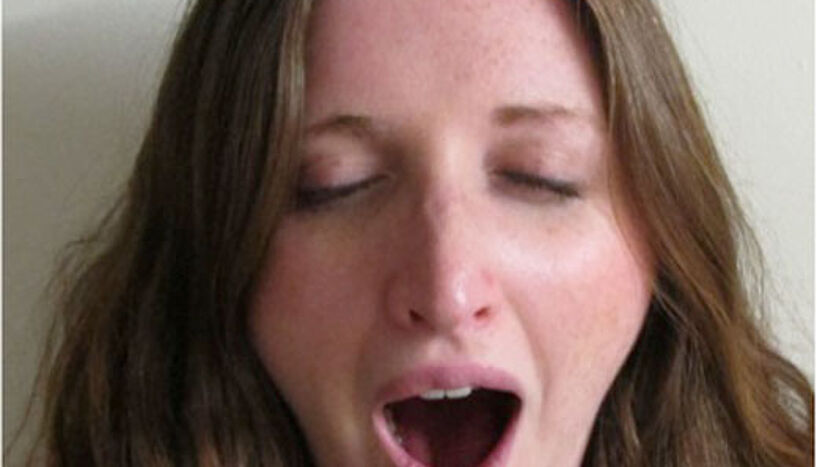Yawning to cool the brain
06. Mai 2014
Yawning helps to cool the brain (Copyright: Andrew Gallup).
Why do we yawn? We tend to yawn before sleep and after waking, when we are bored or under stimulated. We yawn in the anticipation of important events and when we are under stress. What do all of these have in common? Researchers from the University of Vienna, Austria, and the Nova Southeastern University and SUNY College at Oneonta, USA highlight a link with thermoregulation, and in particular, brain cooling. The results of their study have been published in the scientific journal "Physiology & Behaviour".
Common belief is that yawning helps to increase the oxygen supply. However, previous research has failed to show an association between yawning and blood oxygen levels. New research by a team of researchers led by Psychologist Andrew Gallup of SUNY College at Oneonta, USA now reveals that yawning cools the brain.
Sleep cycles, cortical arousal and stress are all associated with fluctuations in brain temperature, Yawning subsequently functions to keep the brain temperature balanced and in optimal homeostasis. According to this theory, yawning should also be easily manipulated by ambient temperature variation, since exchange with cool ambient air temperature may facilitate lowering brain temperature. Specifically, the researchers hypothesized that yawning should only occur within an optimal range of temperatures, i.e., a thermal window.
To test this, Jorg Massen and Kim Dusch of the University of Vienna measured contagious yawning frequencies of pedestrians outdoors in Vienna, Austria, during both the winter and summer months, and then compared these results to an identical study conducted earlier in arid climate of Arizona, USA. Pedestrians were asked to view a series of images of people yawning, and then they self-reported on their own yawning behavior.
Results showed that in Vienna people yawned more in summer than in winter, whereas in Arizona people yawned more in winter than in summer. It turned out that it was not the seasons themselves, nor the amount of daylight hours experienced, but that contagious yawning was constrained to an optimal thermal zone or range of ambient temperatures around 20o C. In contrast, contagious yawning diminished when temperatures were relatively high at around 37o C in the summer of Arizona or low and around freezing in the winter of Vienna. Lead author Jorg Massen explains that where yawning functions to cool the brain, yawning is not functional when ambient temperatures are as hot as the body, and may not be necessary or may even have harmful consequences when it is freezing outside.
While most research on contagious yawning emphasizes the influence of interpersonal and emotional-cognitive variables on its expression, this report adds to accumulating research suggesting that the underlying mechanism for yawning, both spontaneous and contagious forms, is involved in regulating brain temperature. In turn, the cooling of the brain functions to improve arousal and mental efficiency. The authors of this study suggest that the spreading of this behavior via contagious yawning could therefore function to enhance overall group vigilance.
Publication in "Physiology & Behavior"
Massen, J.J.M., Dusch, K., Eldakar, O.T. & Gallup, A.C. (2014) A thermal window for yawning in humans: Yawning as a Brain Cooling Mechanism. Physiology & Behavior.
Published online on April 12th.
doi: 10.1016/j.physbeh.2014.03.032.
Scientific contact
Jorg J.M. Massen, PhD
Department of Cognitive Biology
University of Vienna
1090 Vienna, Althanstraße 14
T +43-699-1131 0182
jorg.massen(at)univie.ac.at
Further inquiries
Mag. Alexandra Frey
Press office, University of Vienna
Research and Teaching
1010 Vienna, Universitätsring 1
T +43-1-4277-175 33
M +43-664-602 77-175 33
alexandra.frey(at)univie.ac.at
Wissenschaftlicher Kontakt
Jorg J.M. Massen, PhD
Department für KognitionsbiologieUniversität Wien
1090 - Wien, Althanstraße 14
+43-699-1131 0182
jorg.massen@univie.ac.at
Rückfragehinweis
Mag. Alexandra Frey
Media Relations ManagerUniversität Wien
1010 - Wien, Universitätsring 1
+43-1-4277-17533
+43-664-8175675
alexandra.frey@univie.ac.at
